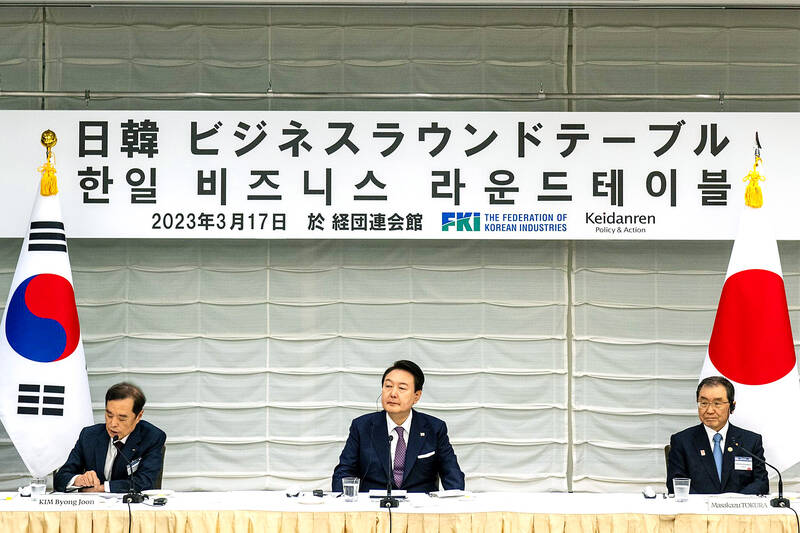Shares of South Korean electronics makers yesterday surged after Japan said it would roll back export restrictions of key semiconductor materials, laying to rest concern about the fragility of an important link in the tech supply chain.
SK Hynix Inc jumped as much as 7.3 percent, the biggest intraday rise in more than two months. Samsung Electronics Co rose more than 2 percent and LG Electronics Inc gained as much as 1.7 percent
Japan said it plans to ease licensing requirements on fluorinated polyimide, hydrogen fluoride and photoresists — all essential ingredients for the manufacture of displays and semiconductors that go into gadgets, including Apple Inc iPhones. The announcement was made during the first formal summit between the two nations’ leaders held on Japanese soil in more than a decade.

Photo: Bloomberg
Japan began requiring licenses to export the compounds to South Korean firms in 2019 amid a dispute over compensation for Korean workers forced to work in Japanese mines and factories during its 1910-1945 colonial rule.
The curbs roiled South Korea’s biggest firms, prompting Seoul to file a complaint with the WTO. While the restrictions did little to affect shipments of the materials, they were perceived as a threat to hurt Seoul economically, and helped drive the two US allies further apart.
A breakthrough came last week after South Korean President Yoon Suk-yeol said South Korean firms, rather than Japanese ones, would finance a foundation set up to address the forced labor dispute.
South Korea has also said it would drop its WTO complaint.
However, the thaw has just begun. Japan has not decided when it would ease the export restrictions. Nor has it decided whether to categorize South Korea a most-favored trading partner again, Japanese Minister of Economy, Trade and Industry Yasutoshi Nishimura told reporters yesterday.
The three materials that had most concerned Seoul are controlled almost wholly by Japanese companies, such as JSR Corp, Shin-Etsu Chemical Co and Tokyo Ohka Kogyo Co.
Tokyo had expressed concerns about Seoul’s export controls when it tightened exports on the three chemical products. At the time, some politicians claimed that there were unauthorized reshipments of the chemicals to other countries, but Seoul disputed the allegations.
South Korea’s export controls have since improved, Japanese trade ministry officials said.

Sweeping policy changes under US Secretary of Health and Human Services Robert F. Kennedy Jr are having a chilling effect on vaccine makers as anti-vaccine rhetoric has turned into concrete changes in inoculation schedules and recommendations, investors and executives said. The administration of US President Donald Trump has in the past year upended vaccine recommendations, with the country last month ending its longstanding guidance that all children receive inoculations against flu, hepatitis A and other diseases. The unprecedented changes have led to diminished vaccine usage, hurt the investment case for some biotechs, and created a drag that would likely dent revenues and

Global semiconductor stocks advanced yesterday, as comments by Nvidia Corp chief executive officer Jensen Huang (黃仁勳) at Davos, Switzerland, helped reinforce investor enthusiasm for artificial intelligence (AI). Samsung Electronics Co gained as much as 5 percent to an all-time high, helping drive South Korea’s benchmark KOSPI above 5,000 for the first time. That came after the Philadelphia Semiconductor Index rose more than 3 percent to a fresh record on Wednesday, with a boost from Nvidia. The gains came amid broad risk-on trade after US President Donald Trump withdrew his threat of tariffs on some European nations over backing for Greenland. Huang further

Nvidia Corp’s GB300 platform is expected to account for 70 to 80 percent of global artificial intelligence (AI) server rack shipments this year, while adoption of its next-generation Vera Rubin 200 platform is to gradually gain momentum after the third quarter of the year, TrendForce Corp (集邦科技) said. Servers based on Nvidia’s GB300 chips entered mass production last quarter and they are expected to become the mainstay models for Taiwanese server manufacturers this year, Trendforce analyst Frank Kung (龔明德) said in an interview. This year is expected to be a breakout year for AI servers based on a variety of chips, as

HSBC Bank Taiwan Ltd (匯豐台灣商銀) and the Taiwan High Prosecutors Office recently signed a memorandum of understanding (MOU) to enhance cooperation on the suspicious transaction analysis mechanism. This landmark agreement makes HSBC the first foreign bank in Taiwan to establish such a partnership with the High Prosecutors Office, underscoring its commitment to active anti-fraud initiatives, financial inclusion, and the “Treating Customers Fairly” principle. Through this deep public-private collaboration, both parties aim to co-create a secure financial ecosystem via early warning detection and precise fraud prevention technologies. At the signing ceremony, HSBC Taiwan CEO and head of banking Adam Chen (陳志堅)